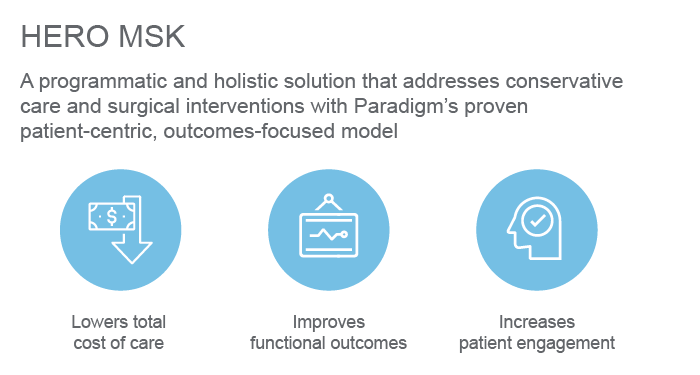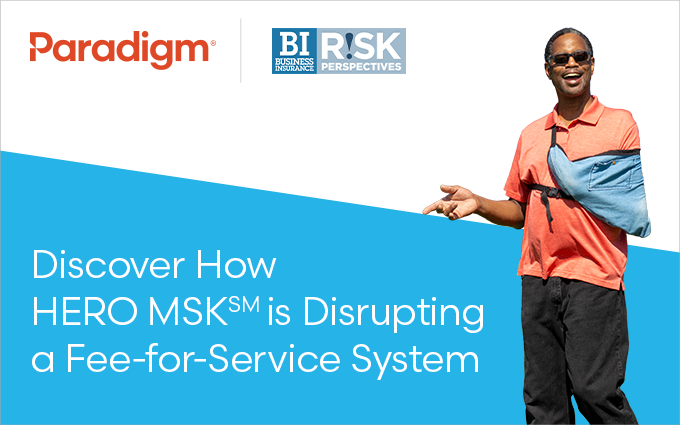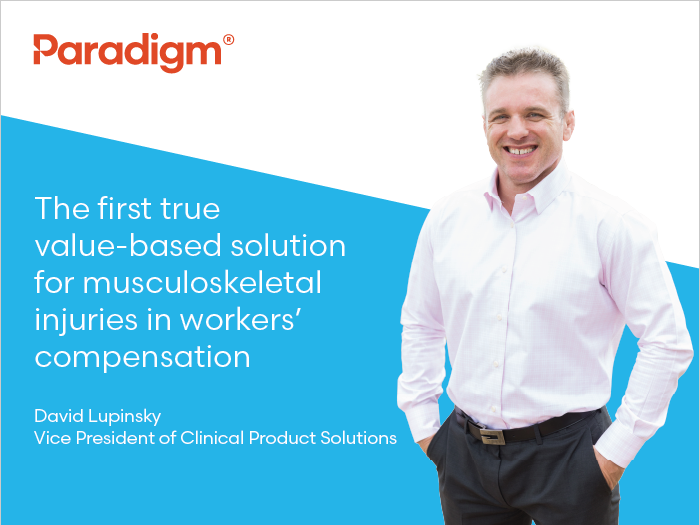Risk & Insurance
Full article on: RiskandInsurance.com
Musculoskeletal (MSK) diagnoses—including shoulder, knee, and back injuries—are among the most common incidents that occur on the job. Although most are minor and involve a relatively short recovery, outlier cases can be extremely costly, with a small portion accounting for much of the total cost of workplace injuries. In fact, $20 billion is spent on MSK cases each year in workers’ compensation.1
Stakeholders need to be able to proactively identify these higher-risk MSK cases and put them on a path that creates the best functional outcomes and helps the injured worker return to work. When more volatile cases are allocated the same—and often wrong—resources as less complicated injuries, there is a higher chance of delayed recovery and creeping catastrophic losses. Without proper patient-specific attention, these injured workers are left dealing with an uncoordinated care system, the prospect of unnecessary treatments, and disengagement with their recovery.
Paradigm’s HERO MSKSM is the first true value-based solution for musculoskeletal injuries in workers’ compensation. This holistic approach identifies injured worker needs and addresses conservative care and surgical interventions based on advanced data analytics and day-one evaluations from specially trained, condition-specific nurse care managers. By leveraging Paradigm’s proven human-centered, outcomes-focused model for catastrophic and severe injuries, HERO MSK brings much-needed episodic care to musculoskeletal injuries.

Paradigm’s Vice President of Clinical Product Solutions, David Lupinsky, has spent nearly two decades in the third-party administration and medical management sectors. As someone with firsthand experience seeing the challenges of MSK injury treatment in a fragmented, fee-for-service system, he has become a passionate advocate for value-based solutions and proactive patient engagement. In a wide-ranging Q&A, he discusses the importance of rewarding value over activity, the need to proactively identify at-risk cases, the benefits of guaranteed outcomes, and the impact of provider collaboration and shared risk.
What is the current picture of MSK injury management in workers’ compensation and what problems contribute to high costs and delayed recovery for so many cases?
David Lupinsky: MSK care in workers’ compensation is still largely driven by a fee-for-service model that incentivizes volume over outcomes and networks that home in on unit price and discounts. This leads to a focus on activity instead of value creation and can even set up an adversarial relationship between providers and payers, with no benefit to the injured worker. For example, providers may utilize a higher reimbursement CPT code that the payer’s bill review process will look to “down code.” This adds activity, but neither entity has reimbursement tied to the specific value they bring to outcomes for the injured worker.
We need incentives that get everyone aligned around overall health, quality care, and functional outcomes for injured workers. In doing so, we’ll need to move “upstream” to identify risk factors and proactively manage them. Or, better illustrated through an analogy, instead of just pulling people out of the river, we need to go upstream and find out why they are falling in.
For MSK cases, a great example is behavioral health. If we can identify behavioral and psychosocial risk factors early, we can address them before they negatively affect recovery and become compensable issues. We don’t need to wait until we have a behavioral health diagnosis, which then will require a behavioral health clinician. Moving upstream and identifying risk factors allows us to focus on prevention.
How do these broken parts of the MSK treatment system negatively impact everyone involved, including providers, carriers, employers, and injured workers?
David Lupinsky: What we have right now is a fragmented system with providers, ancillary networks, claims administrators, and employers siloed off, potentially working in opposition and often to the detriment of an optimal outcome for the injured worker. Providers are overworked and drowning in prior authorizations and mandatory forms; carriers and employers get caught paying for creeping catastrophic losses on what should be a routine claim; and injured workers are left frustrated to fend for themselves, struggling to navigate the maze of workers’ compensation and a siloed care delivery system.
How can value-based care align incentives, lower costs, and improve outcomes?
David Lupinsky: Basing payments on episodes of care—a single bill for a single injury or event—has tremendous potential to lower costs and improve outcomes. This model shifts the focus to achieving value in the form of healthy, functioning workers, versus saving money through unit price discounts. With more than 30 years of experience and results in value-based care for catastrophic injuries, Paradigm has an established model to deliver episodic care for MSK injuries. Expert care management teams leverage prescriptive analytics and in-depth assessments to identify risk factors early, and injured worker-reported health factors to understand and mitigate emerging concerns. Data and assessment information are then provided to the claims team for insight on interdisciplinary case collaboration.
Why is the current system so fragmented, and how can the system unite around injured workers and encourage patient engagement?
David Lupinsky: We need to encourage a more proactive and patient-centered care system that moves us away from outmoded, patriarchal “sick care.” By moving upstream, injured workers are better engaged and take a more active role in recovery. This also includes a focus on education and health literacy for the injured worker. When injured workers have access to providers and resources that help them learn about their condition and how it is connected to overall health, they become much more likely to commit to recovery and a return to functional activity. The Paradigm model has always put injured workers at the center of care, and HERO MSK enhances this through digital patient engagement, condition-specific telephonic nurses, access to industry-leading clinicians, and integrated medical and behavioral health care management.
Why should providers be accountable partners who share the risk of outcomes, and how can a value-based system ultimately benefit them?
David Lupinsky: Most providers enter medicine because they want to help people, yet many aspects of the current system actively get in the way of that. Clinicians in workers’ compensation feel hampered by forms and prior authorizations and many quality providers are being chased away. A value-based model enables providers to focus on delivering effective, high-quality care instead of following a rigid path of standardization and approved billing codes. Care management organizations that know how to build effective value-based partnerships have a tremendous opportunity to let quality providers focus on their patients and the methods that they know promote better outcomes. In line with these principles, Paradigm has developed a network that provides access to top-quality orthopedic and spine physicians committed to value-based care. Through proprietary, data-driven quality scoring and credentialing, and a commitment to patient satisfaction, HERO MSK ensures connection with providers who understand how to achieve the best outcomes.
Learn how Paradigm’s HERO MSK delivers on the promise of value-based, episodic care and guaranteed outcomes for musculoskeletal injuries.
1 Source: OSHA
___________________________________________________________________________
Read more about Paradigm’s HERO MSK

Value-Based Care and the Future of Workers’ Compensation
Written by: Michael Choo, MD, Jennifer Doyle-Fidler, and David Lupinsky

